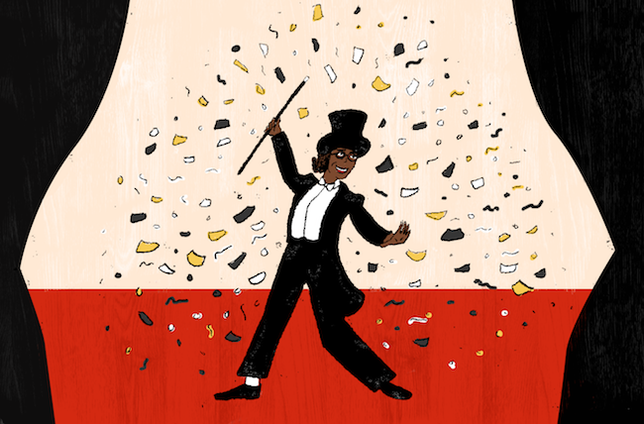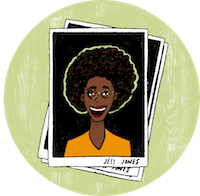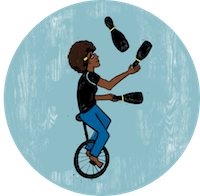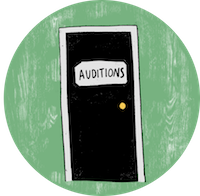How to Make 2018 the Year of You Pt. I

Photo Source: Caitlin Watkins
Every craftsperson has their set of tools to ensure their productivity. In an industry that demands so much, the little choices can be overwhelming. When you get that audition with 24 hours notice, you don’t need to be worrying about your headshot and résumé. Check out these pieces of advice to build your very own toolkit and jumpstart your pathway to success!
Headshots and Résumés
Earlier this year, our Backstage Guide on headshots posed the question and the conundrum, “How can one picture possibly capture all that you have to offer? Therein lies the great challenge of the headshot: capturing the nuances and shades of you as an actor in one convenient image.” Here’s a round-up of the year’s best headshot advice—from experts to actors and beyond.
 On posing.
On posing.
“Sometimes, the camera will be right at eye level, making it possible—depending on how you have your head placed—for it to appear as though you have a double chin (even if you do not). I always teach my acting students the ‘orange’ technique. Throughout the photo shoot—even when you are asked to lower your chin—pretend there is a large orange underneath your chin. You always want a space between your chin and your neck. Honestly, you may feel like a turtle for half of your shoot, but once your photos come out, you won’t be able to tell that you were holding such a pose. Just stay as relaxed as possible, regardless of how unnatural a position may feel.” —Mae Ross
On breadth of images.
“Five or six shots are the most any actor needs, as long as they target the specific roles and categories of roles for which they’re best suited. Don’t confuse the people who have the power to hire you by overloading them (or not offering enough). Make sure that the limited number of headshots on your site and casting profiles fulfill the four jobs of a headshot: they look like you, they read your type, they’re branded “you,” and they show your marketability, aka the exact roles for which you are right. Be the baby bear: have just the right amount of headshots.” —Tom Burke
On what to look for in a photographer.
“Many times when photographers charge inordinate amounts of money because they believe they’re that much better than everybody else, it becomes more about the photographers’ egos and less about the individual actors they are shooting. Everyone knows who shot those headshots because they all look the same. In my experiences, it is the mid-price-range photographers who really care about bringing out the actor’s type, brand, and individuality and less about creating beautiful shots in ‘their’ style for ‘their’ website.” —Tom Burke
On what not to leave off.
“Please—for the love of all that is holy—list your height. When we’re casting an ensemble, we need to know your height so that we can know how you’ll look in the frame with the other actors. If we envision some characters having a particular height, it would be nice to find it without having to make calls or look online.” —Marci Liroff
On building a résumé.
“Before submitting to anything, make sure to take a look at your résumé from an objective point of view and ask yourself, ‘Whose problem is this most likely to solve?’ If it’s not a fit for that role, adjust your résumé so that it does solve that problem, or move on. After all, you can’t fit a square peg into a round hole no matter how hard you try.” —Josh Boyd Rochford
PRO TIP: “Speaking of your résumé, please—for the love of all that is holy—list your height. When we’re casting an ensemble, we need to know your height so that we can know how you’ll look in the frame with the other actors. If we envision some characters having a particular height, it would be nice to find it without having to make calls or look online.” —Marci Liroff
On your special skills.
“The Special Skills section of an actor’s résumé is not a landfill for useless information. This section should only contain actual, special skills that can be performed on stage or screen. But many actors feel that they should have their Special Skills section of a résumé challenge the verbosity of ‘War & Peace’ with questionable ‘skills’ that have no relevance to performing.” —Paul Russell
Building the Image
First impressions are nerve-racking. When you’re constantly meeting new people in the business, it’s important that you curate a professional “image.” Take a look at these pieces of advice to help make sure that you’re nailing those first impressions, without even blinking an eye.
On building your brand as an actor.
“Adopt a new attitude about marketing yourself. Every time you promote yourself, remember that you’re promoting your work and, ultimately, your purpose. You can draw on the same qualities that make you a good actor when doing so. You’re promoting the positive effect you intend to have on people, which is good for them. You’re not ‘wanting all the attention,’ you’re doing a service. That’s a huge difference and people can always feel it. They appreciate it when you care about them.” —Teri Wade
 On tapping into your singularity.
On tapping into your singularity.
“Think about going to an audition. You walk into a room and there are 25 other actors who look like you and are dressed the same. What are you bringing to the party that they aren’t? Why should you get the part? All those actors are talented. They’ve all been studying and doing the right things that led them to the same audition as you. So why should they hire you? Because you have that thing, that aspect of your personality that makes you uniquely you…that special something that only you can bring to a role…your Brand. It’s so easy to see in others, yet so difficult to see in ourselves. This is why I strongly suggest actors seek help…and not from your mother, girlfriend, or roommate, they tend to tell us everything we want to hear. Casting directors, acting teachers, or consultants, like myself, are good sources for honest and realistic feedback. Just get out there and ask people. Ask.” —Tom Burke
On dressing the part.
“The right clothes help actors to look and feel the part and often help establish their type. Actors can create a different persona, depending on what they're wearing. An expensive suit will create a different look and quality than jeans and a t-shirt. Uniforms, dressy evening attire, and camping outfits create distinct looks, and you usually feel different when wearing each. The clothes that you wear to auditions can often influence how directors, agency executives, and clients view you, and they can also be a subliminal callback and booking factor. You and your representation work hard to get auditions, so always be prepared with the appropriate wardrobe to visually create the roles.” —Carolyne Barry
On getting into a routine.
“Set aside a place in your closet for your go-to audition outfits so they’re ready to go at a moment’s notice. If you audition for ‘mom’ roles all the time, put an outfit together that speaks to that. Same with a corporate look. They should be flattering (in color and style), comfortable, clean, and wrinkle-free so when you walk into the room, the client and casting director are impressed with your appearance right off the bat. Also be sure to have an outfit that looks like your headshot (if not the same one you’re wearing in the headshot). Believe me, I’ll have clients ask for you to bring that exact wardrobe to set if you get booked!” —Melanie Forchetti
On the use of social media.
“This is a great time to be an actor. Thanks to social media it’s never been easier for you to create something and share it with the world. By creating your own projects and building an audience for them, you take control of your career. Even if you’re not creating content, social media can help you build your audience and connect with people online that you’d never have access to offline. Right now, social media is an actor's secret weapon but in five years, it’ll be the norm. The next generation of casting directors, directors, and writers are growing up with social media. For them it’ll just be part of their lifestyle and businesses. Learn it now or you’ll get left behind. You can learn how to use social media to create the career you want. It doesn’t matter how old you are or how good you are with technology. All it takes to totally rock your social media is the will to learn, a little time and a good teacher.” —Heidi Dean
Pre-, Post-, and In-the-Room Audition Hacks
Think of the audition like a game—you just need a good strategy. These pieces of advice will help you to form a game plan and allow you to make informed choices about how you navigate the room, before, during, and after.
 On diving into the script.
On diving into the script.
“I read the script and try to find the points of what the writer is trying to say. I try to get off-book as soon as possible. I have this thing—maybe it’s just my process—but I can’t stop thinking about the audition until it’s done. I’m not worrying about the audition, but I come from a theater background, and I try to take three to four weeks of mentally preparing for a theater role and try to do it in 32 hours. I’m on the train, I’m in the car, I’m asking, ‘What would this character wear, what would this character do, where is he from?’ I start asking questions all the way to the [last] minute. That’s how you get closer to finding...your character, which is the golden spot every actor should be in.” —Brandon Micheal Hall
On setting yourself apart.
“Whether it’s your unique personality, hilarious jokes, or your mention of a UFC fighter, be different. I auditioned for the Home Shopping Network a few months ago and they asked what my favorite things to shop for were. I loudly said, ‘Iconic sports memorabilia,’ then talked about my baseball card collection. Something tells me the rest of the women in line to audition had a different answer for that one because my agent got a call immediately after the audition.” —Lindsay McCormick
On finding your groove.
“I was never good at [auditions]. Ever. Ever. I would study the script and try to get ideas and I guess finally, I don’t know when it was, I just stopped trying too hard and I tried to be natural and that’s when it got better.” —Kathy Bates
On connecting in the room.
“Find and look at the reader in the eyes the moment you walk in the room. Don’t stare her/him down, but just make a mental note to catch the reader in the eyes as you walk in and say hello. You walk in and say hello, but if you don’t look the casting director or reader in the eyes, you don’t mentally prepare yourself to see that casting director looking right at you when the scene starts, which can throw you off for a beat or two.” —Douglas Taurel
On remembering why you’re there.
“Come to do the work you love so much, not to please or get our approval.” —Risa Bramon García
On making and sticking with your choice.
“More often than not, you won’t have the entire script while auditioning, nor will you know exactly what the CD and director want from you. Not the easiest scenario, but one that means you will need to make choices about how you play the character. What is she thinking? What is he feeling? Don’t worry about being right or wrong—just make a choice in each moment, trust yourself, and go with it.” —Denise Simon
Tidak ada komentar